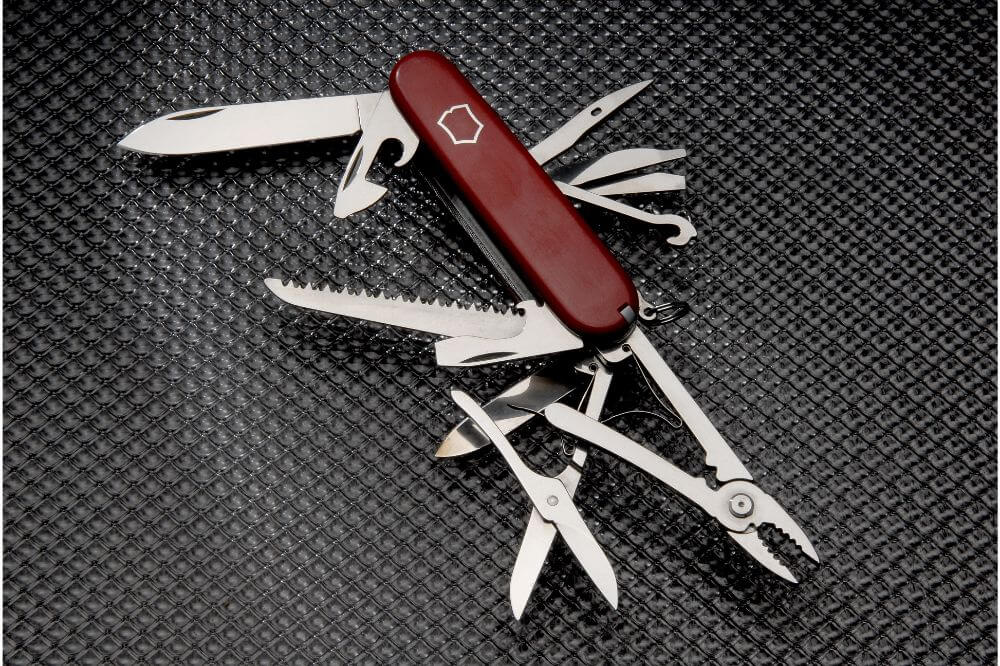Swiss army knives are an iconic and ubiquitous part of the great outdoors. They’re a staple for hikers, campers, and survivalists alike. And when it comes to keeping your knife in good working order, there may be nothing more important than keeping it well-lubricated. That said, if you don’t know what type of lubricant is best for your knife (or how to apply it), we can help!
How To Clean a Swiss Army Knife – Our Guide To Servicing Your Knives
It’s important to use the right lubricant for your Swiss army knife. These versatile knives are made from a variety of metals, so you need a lubricant that won’t react with any of them. Household oils and grease should never be used on Swiss army knives; these petroleum products will cause corrosion over time and can degrade steel, trapping grime inside.
Instead, opt for a lubricant specially formulated to protect your knife’s steel surfaces from rust and corrosion, loosen rusty parts, and liquefy dried oil or grease.
We recommend TUF-GLIDE Room Temperature Vulcanizing, because it contains PTFE (polytetrafluoroethylene) – the most slippery substance known to man! It is well suited for lubricating Swiss army knives in all climates, because it doesn’t break down in extreme conditions like other lubricants will.
To apply TUF-GLIDE, carefully remove any existing oil or grease using naphtha (lighter fluid). Apply several drops of TUF-GLIDE directly onto the knife mechanism and wipe away any excess. Your knife will glide like new!
If you don’t have TUF-GLIDE on hand, look for a lubricant that contains PTFE or graphite. Petroleum products should be avoided at all costs. Also, steer clear of greasy oils and silicone spray: while these might seem like good choices at first blush, they attract dust and grime over time and can cause further damage to your Swiss army knife.
What NOT To Do
Dishwasher or Bleach
Whether you’re cleaning a Swiss army knife or sharpening a knife, avoid dishwasher detergents and bleach. These harsh chemicals can strip away your lubricant, corrode the metal components on your Swiss army knife, and cause rusting.
Sandpaper and Rust Remover
It’s impossible to talk about cleaning Swiss army knives without mentioning sandpaper. Avoid using any type of abrasive paper on your Swiss army knife – it will damage the paint, cause rusting, and make your knife look worse than before! If you notice rust on your Swiss army knife, use a rust remover.
While these are effective at removing rust, they are also harsh chemicals that can damage your knives.

Before You Start
Clean Off Any Surface Grime and Gunk
Before applying lubricants, remove any surface grime or dirt that may have accumulated. You can use a cotton swab, cloth, rag, paper towel – anything you have around the house! Then warm your Swiss army knife in your hands for a few minutes to help liquefy any dried oils and grease. This will make it much easier to remove them from the knife.
Cleaning Your Knife
After you lubricate your knife, give it a good wipe down with a cloth. Dirt and dust will settle on the surface of your knife over time; this helps prevent rusting and corrosion from forming. Wiping off any excess is an extra step that most people forget about – but can be extremely helpful if done regularly!
After Cleaning
Be sure to store your Swiss army knife in a dry, cool place. Exposing it to direct sunlight as well as extreme conditions will cause corrosion and rust. It only takes a few minutes of exposure to warm or humid air for moisture to form on metal surfaces, which can lead to rusting. Store it where the temperature and humidity is consistent.
Don’t forget to lubricate your Swiss army knife regularly, too! We recommend checking your Swiss army knives for wear and tear once every few months, and applying TUF-GLIDE or a similar product as needed.
How often you maintain your Swiss army knife depends on climate conditions where you live, as well as how you use and store your knives.
Conclusion
The Swiss Army knife is a tool that does it all, but if you neglect to clean and lubricate your blades regularly, the tools will eventually become dull. The process of cleaning and lubing may seem daunting at first glance, but with these simple steps anyone can do it!
All you need are cotton swabs or paper towels for scrubbing away grime, naphtha (lighter fluid) to remove any oils or greases on the surface before applying TUF-GLIDE Room Temperature Vulcanizing Lubricant. If it’s not available, then use PTFE based product like graphite.
Petroleum products should be avoided as they attract dust over time which in turn causes rusting. Clean off the excess after every oil

